
The cloud unit of Chinese tech giant Tencent says that it will open its first data centre in South America, located in São Paulo, Brazil. With the Latin American addition, Tencent Cloud’s network now covers 27 regions and 68 availability zones, highlighting the company’s ambitions to become an international digital infrastructure provider.
According to the announcement, the new data centre will adopt Uptime Tier-III international high-standard computer rooms, with PCI DSS, ISO 27001 and other internationally recognised infrastructure certifications.

Access deeper industry intelligence
Experience unmatched clarity with a single platform that combines unique data, AI, and human expertise.
Uptime Institute’s Tier Standard is the global standard for data centre reliability and overall performance. The classification ranks facilities from 1 to 4, with 1 being the worst and 4 the best-performing level.
PCI DSS and ISO 27001 are international standards on how to manage information security.
Tencent also said it would feature a high standard of redundant network optical fibre connections to many network exchange hubs in São Paulo. This describes a situation in which multiple geographically diverse cable routes provide service to the same client site, creating a safety net so that if something were to happen to the primary fibre cable, service to the client would not be interrupted.
Tencent added that it would provide flexible computing, storage, big data, artificial intelligence, security and other cloud services to Brazil and other Latin American countries, a region with growing demand for digital infrastructure.

US Tariffs are shifting - will you react or anticipate?
Don’t let policy changes catch you off guard. Stay proactive with real-time data and expert analysis.
By GlobalDataSão Paulo is the largest city in South America and the region’s primary hub for commerce, finance, science and technology and transportation. It has the largest bandwidth resources in South America and plays a key role in the digital development of Brazil and its neighbouring countries.
Certain parts of South America are digitalising rapidly, especially following Covid-19 which highlighted the importance of virtual connectivity. Latin America, following the pandemic, began investing heavily in digital solutions.
However, internet access remains uneven and often too expensive for the average citizen. Currently, less than 50% of the region has fixed broadband, according to a study by the World Economic Forum.
Given this significant gap in the market, Chinese companies have in recent years introduced numerous projects to bridge the digital divide in the region through the so-called Digital Silk Road (DSR) initiative.
The DSR aims to improve digital connectivity in participating countries, with China as the main driver of the process. On the macro level, the DSR is about the development and interoperability of critical digital infrastructures such as terrestrial and submarine data cables, 5G cellular networks, data storage centres, and global satellite navigation systems.
Yet, at its core, it is about much more than just infrastructure. The DSR aims to build a less US-centric network world and foster a more Sino-centric global digital order. President Xi Jinping is pursuing this goal by enabling the opening of new markets for Chinese tech giants such as Alibaba, Tencent and Huawei, and by strengthening the world’s digital connectivity with the Middle Kingdom.
Despite Chinese infrastructure dominance in LatAm, the US based global cloud giants have been present for some years: Tencent is late to the party. Amazon Web Services started spreading beyond Brazil (the usual arrival nation) in 2019 and Microsoft’s Azure came to the continent back in 2013. Google Cloud Services launched in São Paulo in 2017.
Glaucio Marques, CEO of Level Up!, one of the top gaming operators in Brazil, responded to the news of Tencent’s new data centre in São Paulo saying:
“As a partner of Tencent Cloud, Level Up! looks forward to welcoming Tencent Cloud’s entry into the Latin American market. This new infrastructure in place allows us and other institutions across a wide of range of business sectors to capitalise on Tencent Cloud’s years of experience in providing stable and robust networking solutions. We are excited to leverage the strong infrastructure solutions to optimise gamers’ experience and provide better services for our customers.”
Worth US$466bn in 2020, the data centres market will become a US$948bn industry by 2030, growing at a compound annual growth rate (CAGR) of 6.7% over this 10-year period, according to GlobalData’s forecasts.
The total investment in public cloud Infrastructure as a Service (IaaS) and Platform as a Service (PaaS) in Brazil is likely to reach US$3 billion in 2021, up 46.5% year-on-year, predicts market research company IDC.
Tencent Cloud, which still operates most of its cloud centres in China, has accelerated its international expansion over the last three years. In June, the tech giant launched new data centres in Bangkok, Hong Kong, Tokyo and Frankfurt.
Prior to that, it opened its availability zone in South Korea and its first internet data centres in Indonesia, the Middle East and North Africa, the latter as part of a deal with the Bahrain Economic Development Board.
According to GlobalData’s thematic scorecard ranking companies based on overall leadership in the cloud industry, Tencent currently ranks seventh.







